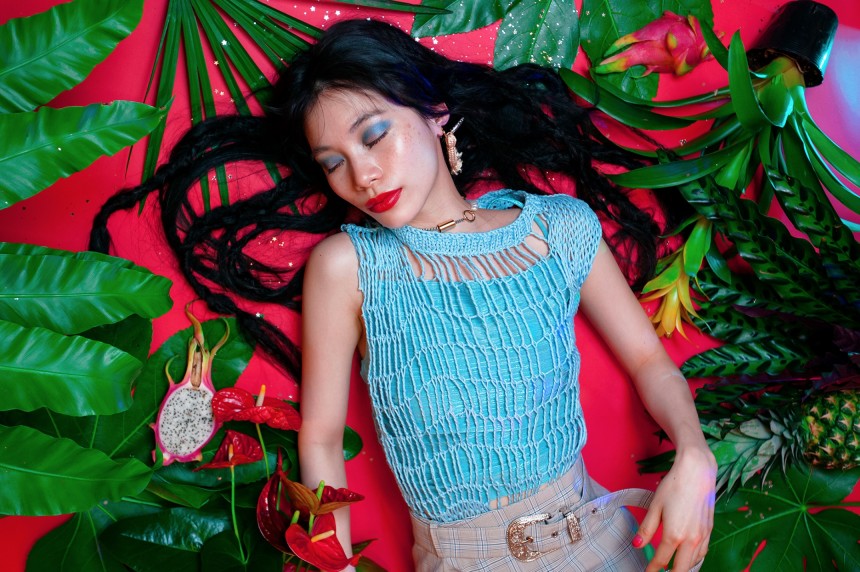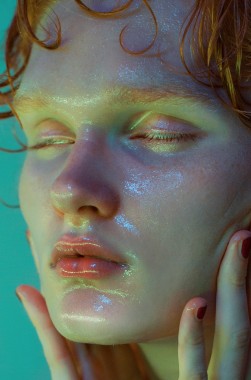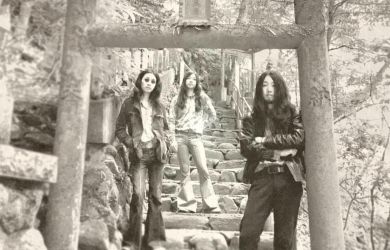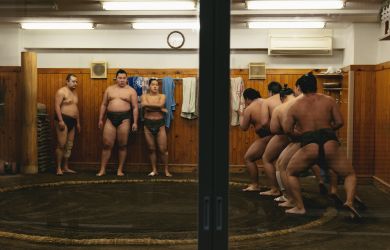
Like dreams, Tokyo is limitless. Maids wearing cat ears beckon from street corners, snakes slither on cafe tables and architectural wonders explore the limits of possibility. If the human mind contains multitudes, then so too does this city, where a wandering soul can step off a nondescript street and into the heart of their deepest, darkest desires. To my eye, the connection between Tokyo and the work of 25-year-old photographer Yulia Shur (AVGVST) runs deep. When I first saw her work, with its warped color and surreal imagery, it immediately struck me as touching on something very close to the heart and soul of this city. Her photographs draw you into their illusion and make it impossible to look away. It was surprising, then, to discover that the photographer was already exploring concepts like “Illusions, poisoned beauty, death, fear and subconscious fantasies” long before she ever moved to Tokyo.
“I always had a vivid imagination,” she says of her journey into photography. “A huge part of my inspiration comes from my dreams. When I was a teenager, dreams were especially intense and deep. I almost balanced between dreams and reality, sometimes not realizing where I was. So I just had to find something to get rid of all those pictures in my head.” Growing up in Eastern Europe in a city called Mogilev in Belarus, photography was a different and distant kind of dream. With a population 25 times smaller than Tokyo’s, Mogilev (which means ‘grave of a lion’) was culturally and geographically far removed from the urban sprawl of Japan’s capital. Few too were the opportunities to seriously embark on a creative career. “Photography was the main interest, but I never saw successful photographers in my country at that time. I couldn’t even imagine that photography could become my profession,” she says. “To get closer to its world, I studied Photoshop on my own and started working as a freelance retoucher for photographers from different countries when I was 16. I was also experimenting with cheap digital cameras at that time. I would shoot myself at home and then change colors and shapes in Photoshop.”
“Only when I was 21 did I seriously take a camera in my hands and it was love from the first shot. The pictures in my head finally found the way out.”
Perhaps it was her fascination with dreams and images that soon drew Shur’s gaze towards Asia and particularly to Japan. For foreigners, those vibrant, classic symbols of the East can be so removed from our own reality that it feels like something mystical and totally unreal. One year after taking her first shot, she made the move by herself to Tokyo. It was here that she saw the birth of her career, working with clients such as Apple Music, Christian Louboutin, Revlon, Shu Uemura and Beats by Dre after just three years.
“I was attracted by Asia in general, especially by Tokyo — and always wanted to visit,” she recalls. “I remember ‘walking’ through the streets and exploring buildings of Tokyo on Google Maps while being in Belarus. When I finally came to Tokyo three years ago, it felt like love at first sight. I felt something I never felt before – a sense of being at home. I started learning about Japanese culture and tradition while exploring and traveling around Japan. Getting to know Japan better made me fall in love with it even more.”

After three years Shur is basically a veteran, as well as a veritable foreign creative success story. Though she now belongs to creative agency AVGVST, she says the rhythm of her day is essentially the same.
“You do not have and will never have a typical day,” she says of freelance life. “It’s like playing the lottery every day and being ready to take a risk of being left with nothing. When thinking about freelance, everyone instantly thinks about freedom as the main benefit, but there is some hidden contradiction. As an artist, you can always create and think about new projects and ideas anytime. So whenever you allow yourself to rest, you kind of blame yourself for not creating and wasting time. It’s really hard to find balance and allow yourself to take time off.” Add working in a different country with its own unique culture to the mix and you have a potential nightmare on your hands. She admits that being a photographer in Japan can be up and down: “Sometimes you feel that the client is open and interested to try something new and work with a foreign photographer. But sometimes it seems that you can’t get a job just because you are a foreigner and the client doesn’t want to ‘take risks’ somehow.”

Still, it takes a lot to suppress one’s true love of Japan and the photographer is optimistic about the future of freelancing here. “There is no single recipe that suits everyone. Even for myself, I haven’t found a perfect formula yet. I can say that I try to listen to myself more often [than] to other people, see inspiration in everything and never stop creating what [I] really love.”
“Japan is changing very rapidly,” she says, “Even in the three years that I [have been] here. So let’s see.”
For now, Shur’s burgeoning career is shining bright. Like all good art, her photography and film work is not always easily digestible. Her characters lay themselves bare without shame; exposing the deepest aspects of themselves, they exist in a limitless world without gender, expectations or rules. The ability to evoke a spectrum of feeling at once is not an easy thing to tap into and it’s what makes her work so captivating. “To be honest, it doesn’t matter what the viewer feels looking at my work: interest, beauty or even disgust. The main thing is that [they] feel something while looking at it.” Everything is malleable, multilayered and subject to change — just like a dream.





